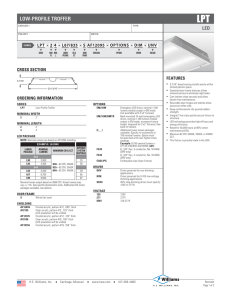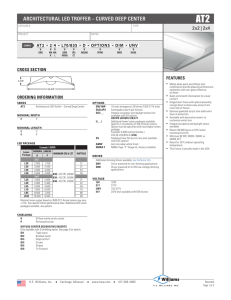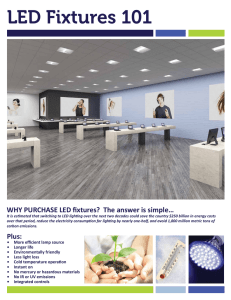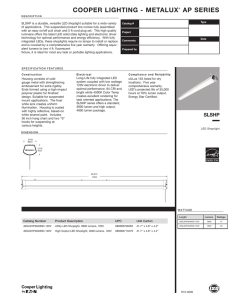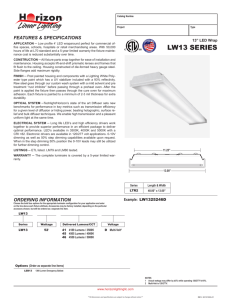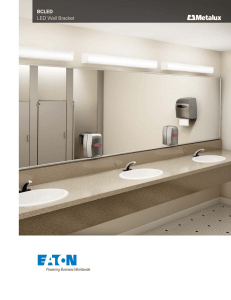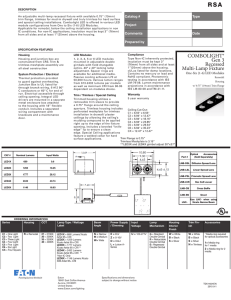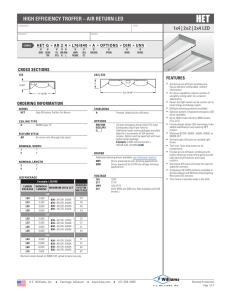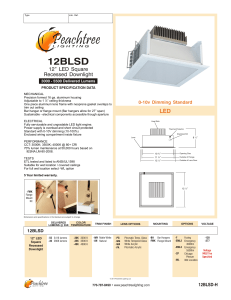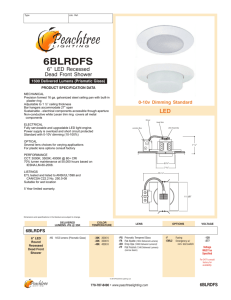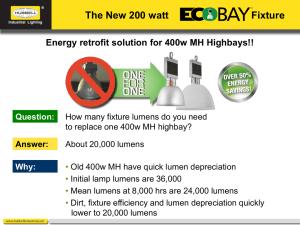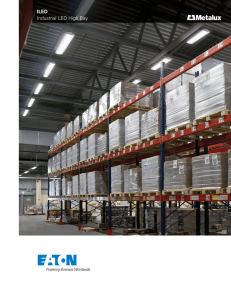LED - Westar Energy
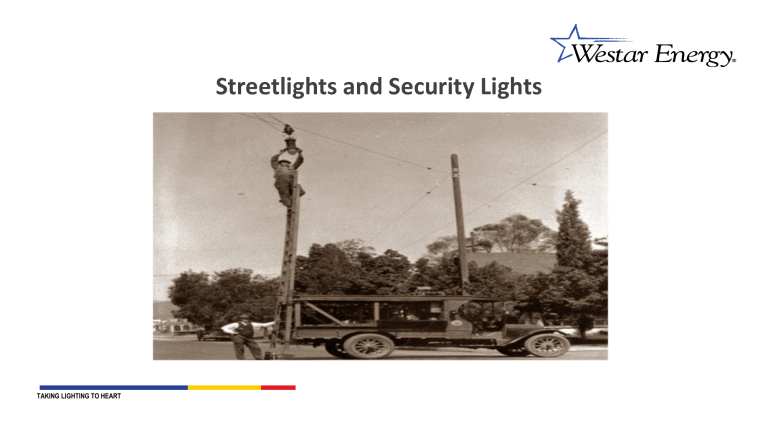
TAKING LIGHTING TO HEART
Streetlights and Security Lights
ATB0
Replaces 70 – 200 W Cobraheads
2,300 – 11,000 Lumens
14 Lbs
Autobahn Family
Lumens
23K
ATB2
Replaces 200 – 400 W Cobraheads
7,000 – 23,000 Lumens
21 Lbs
11K
9K
ATBS
Replaces 70 – 150 W Cobraheads and Area Lights
1,700 – 9,700 Lumens
12 Lbs
2K
Supplemental transient voltage suppressor
ATBS: Electrical & Mechanical
Field-adjustable
Output
Internal
Bubble
Level 2-Bolt Mounting
Clamp for 3G
Vibration Rating
IP66 Rated Driver
Utility-friendly
Terminal Block
Cast-in
Step leveling
Acuity Surge Protection
ANCI cat. C rated - 10kV/5kA
LED Performance
Optical Summary:
• Optical equivalent up to 40W HPS/MH
• Up to 24900 Total Lumens
• Multiple Lumen Packages available
• Prismatic: Type II, III & V distributions
• Rain Panel: Type II, III & V distributions
• 4K CCT available – crisp white light
LED – Before and After
• 3-5 Year Life • 15-20 Year Life
TAKING LIGHTING TO HEART
5
• IP66
Product Overview
• Superdurable paint, 2500 hours Salt Fog rating
• 2G vibration rated
• Knuckle mount
• Yoke mount- painted or galvanized
• Terminal block standard
• PEC receptacle standard
• RoamVue optional
• Bolted door or latched option
• Wire guard, vandal guard options
• Visor
• Upper/bottom visor
ACP Medium
Replaces 100 – 400 W Floods
5,462 – 23,072 Lumens
ACP LED Family
Lumens
33K
ACP Large
Replaces 400 – 1000 W Floods
18,482 – 33,060 Lumens
23K
18K
5K
Quick Disconnect for
Driver Power Output
Product Overview: Electrical
Lineman Friendly Terminal Block
Quick Disconnect for
Driver Power Input
State-of-the-Art Drivers
( 700mA, 1000mA)
Surge Protection
ANCI cat. C rated - 10kV/5kA
Product Overview: Optical
Durable Glass Lens
• Durability & protection of LEDs
Internal Optics
• State-of-the-art COB LEDs (Chip-on-Board)
• Highly specular internal reflectors
• Multiple lumen packages
ACP Large
• 7,8,9 COB modules
• 4000KCCT, 70 CRI
• 5000K CCT, 70 CRI
• 6X5, 6X6 distributions
ACP Medium
• 2, 3, 4, 5, 6 COB modules
• 4000KCCT, 70 CRI
• 5000K CCT, 70 CRI
• 5X5, 6X5, 6X6 distributions
TAKING LIGHTING TO HEART
Ques
tions?
Industrial Lighting
Applications and considerations
Steve Brownback
CBM steveb@cbmrep.com
Industrial Lighting - What matters most
Industrial customer concerns:
Save money
Energy savings
Maintenance savings
I need more light where I need it
This is key
More light = better productivity and safety
Agenda
• How do we perceive light: CRI - Kelvin
• Existing technology review
• LED
– What it is
– How to compare
– What is important in a fixture
What is CRI and Kelvin temperature
Kelvin Temperature: what comes out.
Warm vs cool light
Eye sees better in blue light
CRI: what we see
Range 0-100
Measures intensity at specific wavelengths
Based on incandescent
Imperfect scale
Existing In your facilities
• Fluorescent
– Instant on, hard to dim, lamps 4-6 years, lumen depreciation
• HID
– Long warm up, high LPW, MH 24,000 life, HPS yellow
• Solid State: LED
– Instant on, high LPW, easy to dim, OCC, minimal maintenance
LED
Components of an LED fixture
• LED : Light Emitting Diode --- Lamp
• Driver --- ballast
• Surge Protector --- drivers are not as robust as magnetic ballasts.
– Helps suppress transients (not the same as a fuse)
• Optic – still very important
• Housing – LED fixtures still need a housing
How to compare LED for Industrial
What matters most
• Lumen output
• Watts consumed
• Energy efficiency (lumens per watt)
How to compare LED for Industrial
What matters most
LIFE – LED is a whole new ball game. This is NOT HID
– When will the lights go out?? With LED they don’t go out (unless there is a problem)
– Driver life 100,000 hours
– Optic life- so long may need cleaning before replaced
Lamp Mortality – all traditional sources
LED Lamp Lumen Depreciation LLD
L70
100%
70%
T hreshold
Cooler
T = 25C
Hotter Required Lighting
L70 (hrs)
T ime
Lumen Maintenance curves define LED life. And this varies with temperature.
Light Loss Factors and LED
Will it pass the test of time?
• LED Light Loss Factors LLF
– LLD: Lamp Lumen Depreciation (LED L70 / TM21)
– LDD: Luminaire Dirt Depreciation
– BF/DF: Ballast Factor (LED Driver Factor DF = 1)
– TF: Thermal Factor (** BIG DEAL IF HOT)
Traditional: Lumens Out = Lamp rated lumens * LLD * LDD * BF * TF
LED: Lumens Out = Initial Lumens* TM21 * LDD * DF * TF
Used to predict long term performance
Fixture efficiency
• Get the lumens OUT!
• Typical office – 75-92%
• Typical highbay – 55-85%
• Typical cobra head – 50-80%
Traditional
LED
Optics – Life and Performance
Customer: “I want an LED that will last 100,000 hours.”
Lets use an optic that will too.
What optics affect:
Maintenance – does it get brown, cloudy or brittle?
Lumen output and efficiency – careful with frosted lenses
Glare - Prisms / Frost / Flat glass
Does it matter if it’s glary?
Distribution – where is light going?
I can see the thing I am trying to look at. YAY!!
Distribution Patterns
Light where you want it
This is the exact same lumen fixture
A
Which is which?
• reflector, symmetric
• refractor, symmetric
• reflector, asymmetric
Get a fixture that fits your space
B
C
Handling Temperature in the Luminaire
AMBIENT AIR
Radiation
(under 20%)
Convection
(over 80%)
INSIDE
FIXTURE
LED
AMBIENT AIR
Conduction
Vertical vs. Horizontal Footcandles
What LED has to offer
• Benefits
– Provide strong down light – great for high mounting heights – check optics
– Can be great for ‘hot’ or cold applications – check temp ratings
– Can be a small surface area so it works well in dirty environments
– Instant ON – no warm up needed to hit full bright.
– Dimmable to 10% - additional energy savings
– Long Life – 100,000+ hour lamp life / 100,000 hour driver life
– Can have good lumen maintenance – maintains high lumen output over the life of the LEDs (TM21)
Thank you!!!
Questions?
Steve Brownback
CBM
913 707 3811 steveb@cbmrep.com
